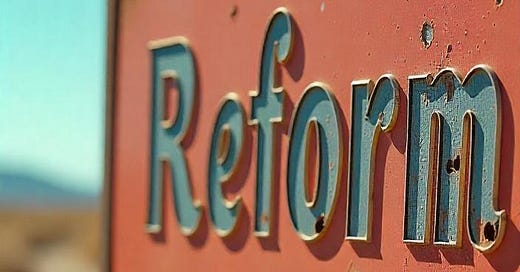The debate surrounding the burqa, a full-body and face covering worn by some Muslim women, frequently ignites controversy in Western societies. Yet, beneath the layers of public scrutiny and political posturing lies a deeply personal garment rooted in a complex tapestry of cultural, religious and individual choices. To truly understand the burqa is to move beyond superficial interpretations and appreciate its multifaceted significance, a perspective often lost in the inflammatory rhetoric of certain political factions. When political figures choose to focus on banning rather than understanding, they not only neglect the rich tapestry of human experience but also risk fanning the flames of prejudice and division within society. The Reform Party, individually and collectively, continue to fan these flames much to the shame of the United Kingdom.
The Burqa ~ A Tapestry of Faith, Freedom and Heritage
To advocate for the burqa is not to ignore complexities, but to insist on a more comprehensive and empathetic understanding. The reasons a woman might choose to wear a burqa are deeply personal and rarely fit into simplistic, monolithic explanations.
Firstly, for many Muslim women, wearing the burqa is a profound act of religious devotion. This isn't merely about adhering to a dress code; it's a spiritual commitment that profoundly shapes their identity. Interpretations of Quranic verses often guide this choice, encouraging modesty, humility and a desire to connect with God in a deeply personal way. The burqa, in this context, becomes a symbol of piety, a visible expression of an inner conviction that extends beyond worldly concerns. To suggest it's simply a piece of cloth is to fundamentally misunderstand its sacred significance, and to deny this choice is to infringe upon fundamental religious freedoms, a cornerstone of any truly democratic society. This spiritual dimension is often overlooked in public discourse, where secular anxieties tend to dominate. The continued demands to ban the burqa by the Reform Party stands in direct opposition to Christina values, often cited as the ‘one true faith’ by Reform members.
Secondly, and crucially, the burqa can be a powerful statement of personal choice and autonomy. In societies that often objectify women and dictate how they should dress to conform to prevailing beauty standards, choosing to wear the burqa can be an assertion of radical independence. It allows women to redirect attention from their physical appearance towards their intellect, character and spiritual being. This choice can be empowering, a deliberate act of reclaiming one's body and presentation in a world obsessed with surface-level aesthetics. For some, it offers a sense of privacy and peace in public spaces, acting as a shield against unsolicited attention or unwanted gaze. While acknowledging that coercion exists in some parts of the world, it is a gross generalisation, and often a dangerous one, to assume that all women wearing the burqa are oppressed. Such assumptions deny the agency and free will of countless individuals who consciously embrace this form of dress.
Furthermore, cultural and historical reasons add rich layers to the burqa's significance. Variations of face and body coverings have been present in numerous cultures across diverse historical periods, often predating the advent of Islam. These coverings served a multitude of purposes, from practical protection against harsh climates in desert regions to markers of social status, expressions of modesty or identifiers of tribal affiliation. In certain geographical areas, the burqa remains deeply interwoven with established local traditions and social norms, representing a continuity with heritage and fostering a strong sense of belonging within a specific community. To demand its abandonment is an assault on cultural identity, a forced assimilation into a dominant culture that disrespects historical legacy and community cohesion. Such demands fail to acknowledge the diverse ways in which communities express their identity and maintain their customs across generations. So much for Reform’s claims to be a party of inclusion.
Reform UK's Stance ~ Pushing the Boundaries of Divisiveness and Anti-Muslim Prejudice?
In stark contrast to this nuanced understanding, members of the Reform UK party continue to amplify a discourse that frames the burqa primarily as a threat to public safety and an impediment to integration. Their consistent approach, characterised by explicit demands for bans, expressions of discomfort and the use of loaded language, raises significant concerns about its inclusivity and its potential to fuel prejudice and anti-Muslim sentiment within British society. This goes beyond legitimate policy debate, veering into territory that many would consider dangerously close to, if not explicitly, racist.
Sarah Pochin, Reform UK's newest MP, wasted no time in making her views known. She ignited a fresh wave of controversy by using her very first Prime Minister's Questions on June 4, 2025, to directly call for a burqa ban, citing "public safety" and drawing what she sees as parallels with France and Denmark. Her rationale, that the burqa hinders police work and acts as a "barrier" to integration, is a simplistic and prejudiced reduction of a complex religious and cultural practice to a mere security risk. This framing prioritises unsubstantiated fears over the rights and identities of individuals. It effectively positions Muslim women as inherently suspicious or un-integratable solely based on their attire. Such arguments often ignore the practical realities of policing, which relies on far more than facial recognition in all contexts and overlooks the fact that many Muslim women wearing burqas are already deeply integrated into British society.
Nigel Farage, the party leader, while carefully avoiding an explicit blanket party policy commitment on the burqa, has nevertheless expressed his strong personal discomfort. On June 10, 2025, he told reporters, "Do I think in cultural terms, the burqa fits in with the British way of life? Not really. No." He further elaborated that "face coverings in public places don't make sense" and that people feel "uncomfortable" around individuals whose faces are covered. Farage's historical stance on the issue is also relevant: he has consistently backed a burqa ban since his time as UKIP leader in 2010. By suggesting that a specific form of religious and cultural dress is inherently incompatible with a vaguely defined "British way of life," Farage's rhetoric is deliberately alienating, marginalising and "othering" a significant segment of the British population. It creates an unnecessary dichotomy between being Muslim and being British, a false premise that undermines social cohesion and fosters resentment.
Richard Tice, the Deputy Leader, has repeatedly called for a "national debate," but the terms of this debate as he defines them are highly problematic. He frames it around concerns that the burqa might be "repressive" and questions whether it is "genuinely their choice." While these questions might seem benign on the surface, his further commentary links the debate to the UK being "founded in Christianity, where women are equal citizens and should not be viewed as second-class citizens." This implicitly positions the burqa, and by extension, elements of Islamic practice, as antithetical to core British values and female equality. This narrative is not only reductive but also deeply misleading, given that countless Christian women embrace equality and countless Muslim women choose the burqa out of empowerment and a desire for spiritual emancipation, not repression. Such framing is a subtle but potent form of cultural chauvinism, suggesting that one set of values is inherently superior to another.
Even the new Chairman, David Bull, a long-time ally of Nigel Farage, has unequivocally articulated his personal views. He has publicly stated that the burqa is a "symbol of oppression" and fundamentally "not acceptable in Britain." Echoing his colleagues, he believes it acts as a "barrier to communication and integration," and personally feels it should be banned alongside other face coverings. While he asserts this is his "personal view," his prominent position as party chairman amplifies this sentiment considerably, giving it official weight within the party's public image. The consistent repetition of these arguments across the party leadership creates a powerful, unified message that is far from inclusive. It is divisive and designed to spread fear and mistrust applying weary tropes to ferment anti muslim feelings.
The Erosion of Inclusion ~ Zia Yusuf's Defining Resignation
The internal fallout from these explicitly articulated views within Reform UK offers a stark and compelling illustration of the party's profound struggle with genuine inclusion. It also demonstrates how their rhetoric pushes the boundaries of what can be considered legitimate political debate into territory that are bordering on, if not explicitly, racist. The highly publicised resignation of Zia Yusuf, the then-chairman of Reform UK and a self-described "British Muslim patriot," was a direct and immediate consequence of Sarah Pochin's questions and the surrounding burqa controversy.
Yusuf, who is Muslim, publicly described Pochin's question as "dumb" because it was not official party policy at the time. He expressed significant frustration and resigned shortly thereafter, stating he no longer believed "working to get a Reform government elected is a good use of my time" (BBC News, June 5, 2025). This was not a mere philosophical disagreement; it was a visceral reaction to what he perceived as harmful and misguided rhetoric. While he later reversed his full resignation, taking on a different role and citing exhaustion, the initial act of stepping down was unequivocally tied to the party's public stance on the burqa and what Labour MP Naz Shah explicitly labelled as "dog-whistle politics." The fact that a senior Muslim figure felt compelled to resign, even temporarily, due to the party's rhetoric on a contentious Muslim issue speaks volumes about the perceived anti-Muslim sentiment and exclusionary atmosphere within Reform UK. His experience highlights how such debates, when framed negatively, can create an unbearable environment for minority members attempting to contribute.
This pivotal incident, coupled with the continued and consistent focus on the burqa by various party figures, strongly suggests that Reform UK is far from a party of inclusion. Their approach, which scrutinises and demonises a garment worn by a minority, often conflating it with security risks or an inherent lack of integration, reflects a sustained anti-Muslim stance rather than a genuine commitment to fostering diversity within British society. This strategic emphasis on cultural wedge issues serves to mobilise a particular segment of the electorate by playing on existing anxieties and stereotypes. By prioritising a divisive cultural issue like the burqa over more substantive policies addressing broader societal challenges, Reform UK risks entrenching divisions, normalising prejudice and fostering an environment where discrimination against Muslim communities can flourish. This ultimately undermines the very fabric of a truly inclusive, harmonious and democratic nation that champions freedom and mutual respect for all its citizens.
Sources:
Sarah Pochin:
"New Reform MP calls on Starmer to ban burqa." The Independent, June 4, 2025. https://www.independent.co.uk/tv/news/sarah-pochin-reform-burqa-ban-starmer-video-b2763583.html
"Reform MP's burka ban call was dumb, says party chair." BBC News, June 5, 2025. https://www.bbc.co.uk/news/articles/cql2pzr5qlqo
Nigel Farage:
"I forgave Yusuf, says Reform UK leader Farage after burka row." BBC News, June 9, 2025. https://www.bbc.co.uk/news/articles/ce81kj65x40o
"Reform MP's burka ban call was dumb, says party chair." BBC News, June 5, 2025. https://www.bbc.co.uk/news/articles/cql2pzr5qlqo
"Reform infighting as chairman appears to call MP's burqa ban question 'dumb'." ITV News, June 5, 2025. https://www.itv.com/news/2025-06-05/reform-infighting-as-chairman-appears-to-call-mps-burqa-ban-question-dumb
Richard Tice:
"What is a burka and what are the rules around wearing one in the UK?" Yahoo News UK, June 8, 2025. https://uk.news.yahoo.com/what-is-a-burka-rules-wearing-one-uk-190706995.html
"Ask women if burka is genuinely their choice, says Reform UK's Richard Tice." The Independent, June 6, 2025. https://www.independent.co.uk/news/uk/home-news/richard-tice-nigel-farage-christianity-reform-uk-keir-starmer-b2764973.html
"Reform's Richard Tice doubles down on call for burqa ban debate after chairman quits." The Independent, June 6, 2025. https://www.independent.co.uk/news/uk/politics/reform-burqa-ban-richard-tice-zia-yusuf-b2765014.html
David Bull:
"David Bull named new chairman of Reform UK." BBC News, June 10, 2025. https://www.bbc.co.uk/news/articles/c3v54d60y6vo
"Former Most Haunted Live! presenter David Bull named new chairman of Reform UK." The National, June 10, 2025. https://www.thenational.scot/news/national/25227680.former-haunted-live-presenter-david-bull-named-new-chairman-reform-uk/
David Bull's views on the burqa
Zia Yusuf (Resignation and context):
"Reform MP's burka ban call was dumb, says party chair." BBC News, June 5, 2025. https://www.bbc.co.uk/news/articles/cql2pzr5qlqo
"Chairman of far-right Reform UK party quits after burqa row." Al Jazeera, June 5, 2025. https://www.aljazeera.com/news/2025/6/5/chairman-of-uks-radical-right-reform-party-quits-after-burqa-row
"Zia Yusuf's resignation from Reform is much more than a row over the burqa." The Independent, June 6, 2025. https://www.independent.co.uk/news/uk/politics/reform-zia-yusuf-nigel-farage-b2765197.html
"I forgave Yusuf, says Reform UK leader Farage after burka row." BBC News, June 9, 2025. https://www.bbc.co.uk/news/articles/ce81kj65x40o
"Zia Yusuf returns to Reform UK two days after quitting over burka ban stance." Evening Standard, June 9, 2025. https://www.standard.co.uk/news/uk/zia-yusuf-reform-uk-quitting-b1231769.html
"Reform UK chairman Zia Yusuf reverses decision to quit party." Sky News, June 7, 2025. https://news.sky.com/story/reform-uk-chairman-zia-yusuf-reverses-decision-to-quit-party-13380464
"Former Reform UK chairman, Zia Yusuf, returns to the party less than 48 hours after resigning." ITV News, June 7, 2025. https://www.itv.com/news/2025-06-07/reform-uk-chairman-zia-yusuf-rejoins-party-just-two-days-after-resigning
"Zia Yusuf returns to Reform UK two days after quitting - BBC News." BBC News, June 7, 2025. https://www.bbc.co.uk/news/articles/cwyv040rnqzo













Share this post